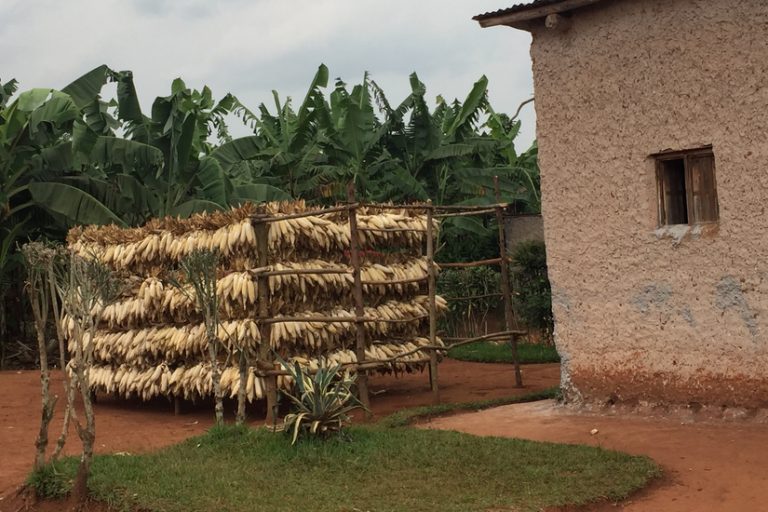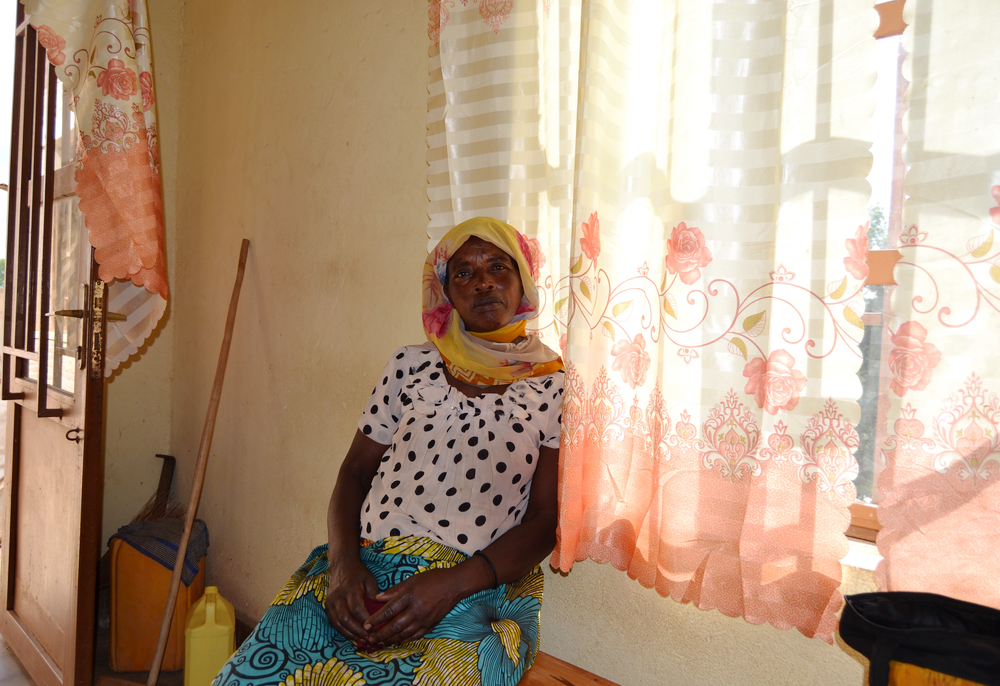
By Steven Nsamaza;
Muhanga: Marie Louise Uwimana practiced intercropping on her small farm in Rutenga village, Nyamabuye Sector on the outskirts of Muhanga town for several years, but her agriculture methods brought her almost nothing until she joined a farmer organization.
Uwimana explains that she thought the practice of planting several types of crops was the best way to feed her family with a balanced diet but she barely harvested on some of the crops.
Her plight as for many smallholder farmers in the same dilemma was majorly on lack of knowledge, skills and confidence to undertake new initiatives from the traditional practices to improve their agriculture.

Marie Louise Uwimana is a farmer in Rutenga village, Nyamabuye Sector of Muhanga district
This was only to change when Uwimana joined Coparwamu Cooperative based in Gahogo, Nyamabuye Sector of Muhanga District. The cooperative was formed to target commercial farming with mainly maize and vegetables.
The cooperative later joined Farm to Market Alliance (FtMA), a platform which connects farmers to buyers and financial institutions. When Coparwamu joined, it also started receiving support from Rwanda Development Organization (RDO), one of the implementing institutions of the initiative.
FtMA is the only initiative in the maize sector in Rwanda that connects farmers through forward delivery contracts to the largest commodity buyers. It ensures that smallholders are empowered to be reliable market players through access to four integrated pathways: predictable markets, affordable finance, technologies and quality inputs – such as seeds, fertilizers and handling and storage solutions.
Although the support provided by FtMA is normally through farmer organizations, the Good Agricultural Practices (GAPs) learned are trickling down to smallholder farmers.
Uwimana is grateful that the trainings provided by RDO helped her increase productivity to become a commercial farmer and she can now earn a good income to provide for her family.
Currently, she earns from the cooperative and productivity from her small garden at home got a quadruple increase.
“The same plot I would harvest 40Kgs before increased to 160Kgs after applying the skills I learned from RDO trainings,” Uwimana disclosed. She adds that today she gets more in quantity and quality depending on the season.
The mother of seven notes that caring for her children became easier and was able to pay for school fees effortlessly and her first born was able to graduate from university. She has built a beautiful house for her family and lives decent life.
Diana Mugwaneza, the Programs Officer at RDO says that they train cooperatives in good agricultural practices (GAPs) among other tools they give farmers at a group level but members are taking the knowledge to their individual farms and areas where even neighbour farmers learn these practices.
Mugwaneza observes that as member farmers realize that cooperatives applying the GAPs get good harvests, farmers start to adopt them in their individual gardens as well and they are more likely to get an increase in productivity.
This does not stop there because neighbours who may not be members of the cooperative also learn from these farmers when they see that someone is practicing a better alternative and ends up trying it themselves.
She explains FtMA’s objective to promote the establishment of the sustainable pro-smallholder agricultural value chain of maize and single variety beans aiming at increasing smallholder farmers’ income and foster commercial viability for private sector actors engaged in the Alliance.
To achieve this, FtMA embarks on training farmers in good agriculture practices, post-harvest handling and storage practices(PHHS), linking Farmer organisations (FOs) to viable markets through contract farming, Facilitate beneficiary farmers in post-harvest equipment acquisition, building capacities of Farmer organisations in cooperative governance and financial management and link farmers to financial institutions to secure financing that help to get inputs, Post-harvest equipment and in Aggregation .
For Uwimana, the benefits didn’t stop at her but also her colleagues and neighbours because after the trainings she was selected as a farmer promoter for her group Twuzuzanye that has about 32 members and she is in-charge of six farmers at the cooperative.
She trains others on how to prepare their gardens, planting in lines, applying both industrial and composite fertilizers and use of improved seeds.
In her village of Rutenga, even as there are village farmer promoters, Uwimana offers them practical knowledge especially on applying industrial fertilizers and improved seeds, as well as reducing losses after harvest.
She explains that, FtMA didn’t only create market linkages with big buyers but taught them how to avoid post-harvest losses to maintain high quality maize. Poor harvest handling almost robbed them a third of the harvest but today they know how to avoid this loss and be able to have a good market for her produce.
She applauds FtMA initiative which came to support farmers to access big markets but also bridge the gap between buyers and producers to maximize financial returns and provide better skills for cooperatives which is altogether benefiting farmers in general.
